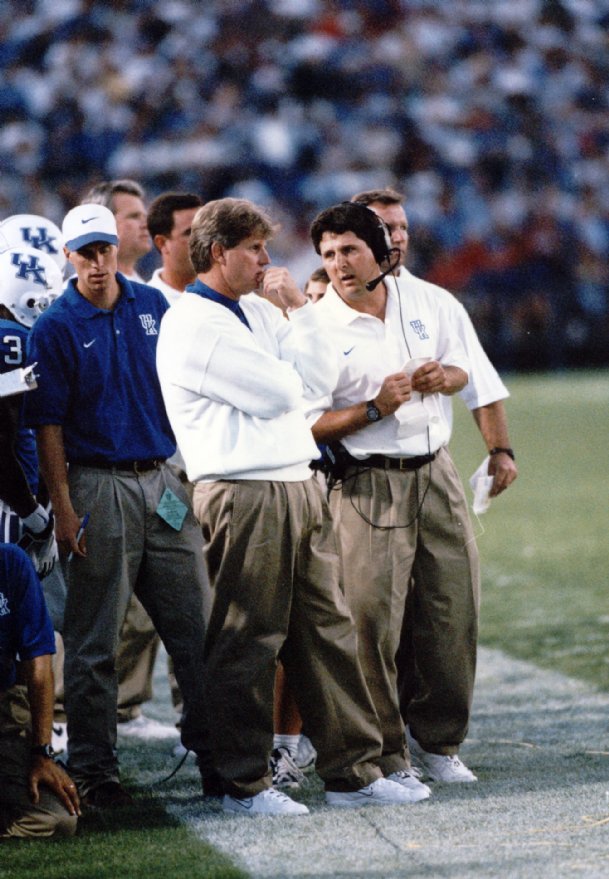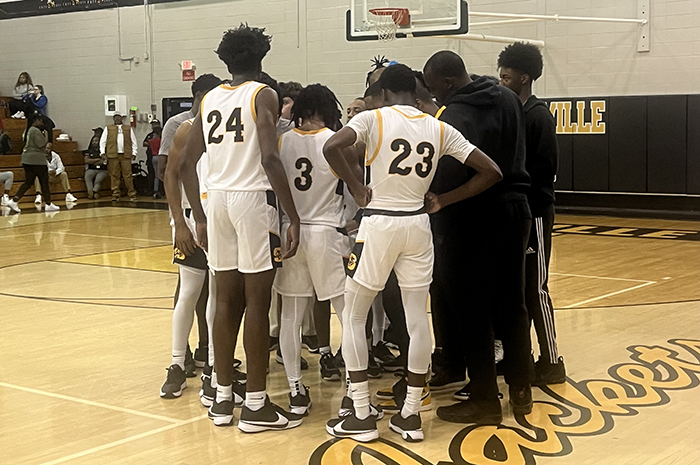STARKVILLE — Dr. George Ginter has spent a lifetime knocking people out.
A 1983 graduate of the University of Kentucky College of Medicine, Ginter has been practicing anesthesiology in the Lexington area for more than three decades. His desk teems with family photos, medical journals and other varying reminders of his long medical career. But mixed into the array is a snapshot on the back of his door that feels out of place.
Donning a gray Washington State hoodie, Ginter is flanked in the image by Mississippi State head coach Mike Leach on his left and Leach’s wife Sharon to the right.
“Give my regards to Mike and Sharon,” he requests. “They’re really good friends.”
A Golden Glove boxer in his youth, Ginter’s pugilism began before a packed house at the Tyndall Armory in Indianapolis in 1974. Five professional bouts followed. So too did a job moonlighting as the club boxing coach at Kentucky.
From featherweights to heavyweights, he’s coached fighters of all shapes, sizes and abilities. But of all the boxers he’s guided through the years, one contingent triggers the most vivid memories: the 1997 Kentucky offensive line and its mercurial coaches: Leach, Hal Mumme and Guy Morriss.
“These were big bad cats,” former Kentucky defensive lineman Grayson Smith said. “And when you gave them that kind of training, you just about turned them into a lethal weapon.”
* * *
Perched at his locker following a practice the summer of 1997, Jason Watts noticed a short, red-headed man wandering the aisles of the facility.
“Anyone know where I can find ‘Jay-Boo?'” the man queried.
Uncertain whether he was a new coach Mumme hired since taking over the program earlier that spring, Watts kept to himself. As the man exited the locker room area, an onlooker asked if he was looking for “Jay Bob.”
Hearing his moniker, Watts perked up. Rounding the corner, the ginger-haired stranger finally found the hulking 6-foot-2, 280-pound offensive lineman. Unclear on his business, Watts remained wary.
“Are you ‘Jay Bob’?” the man asked.
“Well yeah, who’s asking?” Watts retorted.
“I’m the boxing coach,” the man, who revealed himself to be Ginter, said. “I need a heavyweight to box for Kentucky, and I asked who would be the best guy on the team and everybody unanimously, Leach, coach Morriss, they all said, ‘You want to get Watts.'”
The fit made sense. Watts, who concedes he’s mellowed with age, earned a reputation as a rough and rugged combatant. He spent the bulk of his nights during the offseason bouncing at a slew of local bars. On Wednesdays, he’d work the door at Millenium — an establishment voted the best place to dance in a 1998 edition of local publication Ace Weekly. Thursday nights were spent at The Dixie Tavern, while Saturdays were reserved for Lexington Brewing Company.
“He’s as good a man as you’ll ever find,” Smith said. “But at that time, if there were three dudes walking around Lexington, Kentucky, badder than Jason Watts, I didn’t want to meet them.”
“Everybody in the SEC feared him,” Ginter added. “Because he was meaner than s—.”
The idea to cross-train offensive linemen in the ring came from Morriss and Mumme. Transitioning from Bill Curry’s run-heavy, option scheme to the air raid, the imports from Valdosta State were livid with the group’s inability to pass block upon arrival.
“We started it for footwork,” Morriss noted. “Because they were terrible when we got there.”
“We couldn’t block a barn if our life depended on it,” Watts acknowledged.
Calling up Ginter early in his tenure, Mumme asked if he could swing by his office for a chat. Walking into the football facility, Ginter headed toward Mumme’s office when a call from another room rang out.
“Hey you, come on in here; I want to talk to you,” the voice yelled.
Stepping into a side office, Ginter was greeted by a 36-year-old Leach. He nestled into a chair, and spent the next hour and a half speaking with the eccentric assistant coach. Leach regaled him with stories from his and Mumme’s time at Valdosta State, how he’d taken up boxing as a workout regimen and that he hoped he could spend some time with the Wildcats’ boxing team to keep at it.
“Mike and I hit it off,” Ginter said. “And he loved boxing.”
After his enduring conversation with Leach, Ginter and Mumme agreed that he’d train the offensive linemen at 6:30 a.m. three to four days per week ahead of the 1997 season.
“I’ve always been a big believer in it,” Mumme told The Dispatch. “It’s great for their footwork and their hand-eye coordination. People forget how much (offensive) linemen have to, particularly what we do, have great hand-eye coordination, just like receivers, because they’re always constantly trying to grab the (defensive) linemen. You’ve got to be able to hit the target.”
* * *
If hell had a wet closet, it was the Kentucky mat room.
An offshoot of the Wildcats’ weight room, the empty, blue-carpeted space was usually reserved for box jumps and other calisthenics. The damp, humid and uninviting room would serve as the Wildcats’ local version of the MGM Grand.
“A lot of people running out the door to throw up, some people not making it to the door,” Smith said. “It was what you would imagine.”
For weeks, the Kentucky offensive line ran through footwork drills, jumped rope and punched bags and, ultimately, each other. Right tackle Kris Comstock, who stands a towering 6-foot-8 and still looks the part of an SEC football player despite a long career in bourbon sales, and fellow behemoth left tackle Jonas Liening were consistently paired together for bouts. Comstock jokes he may have had the reach on most, but Liening had him beat.
Watts, too, enjoyed spars of his own, though it was his lone meeting with current Kentucky assistant and teammate John Schlarman that still resonates.
Early into their summer boxing workouts, Watts and Schlarman were thrown into the ring for a handful of one-minute rounds. Never one to mince words, Watts inquired why the rounds were so short.
“I’m sitting there thinking, ‘Man, I’ve seen this on TV,” he recalled. “‘Mike Tyson, they go like three-minute rounds for like 15 rounds.’ I’m like, ‘We’re doing one-minute rounds? This is a bunch of horse—-.'”
Limited by Ginter to parrying with their right hands and punching with their lefts, the pair hopped into the ring. Neither shied away as they stepped onto the mat, but both were internally conflicted — a feeling neither shared until their meeting in a hotel lobby more than 20 years later.
Having questioned the shortened rounds minutes earlier, Watts was quickly reminded of the toll boxing takes on the body. Within seconds, his hands grew heavy. He’d forgotten about the weight of the gloves, later quipping he felt like he was going to die just seconds into the brief bout.
Schlarman earned the first and only major blow of the fight, jolting Watts with a punch square in the nose. Turning beet red, Watts was infuriated by the shot, while Schlarman promptly shifted from aggressor to peacekeeper.
“Jason, this is boxing: I’m supposed to hit you,” Schlarman insisted. “Don’t get mad.”
The two were separated, and the match was called.
Meeting at the team hotel in the fall of 2018 during Kentucky’s visit to Florida, Watts and Schlarman shared a laugh over the exchange, while their reunion functioned as a confessional of sorts.
“Man, Jay Bob, as soon as that doctor, that boxing coach, said ‘Schlarman and Watts, box,’ all I sat there and thought was, ‘Of all the people on the team, this is the one guy I don’t want to have to box with,'” Schlarman conceded.
“Well that’s crazy you said that, because that’s exactly what I was thinking,” Watts responded through a laugh.
* * *
As Smith strolled through the hallways of the E.J. Nutter Training Facility, Leach raced down the corridor to catch up with him.
Then just a freshman, Smith had become a regular participant in the weekly boxing classes. After the 1997 season, he joined the Kentucky club boxing team full-time. Heading to Reno, Nevada, on Thursdays for weekend tournaments during the offseason, he’d arrive back in Lexington in time for football workouts the following week. In four years fighting for the Wildcats, he finished in third place at the National Collegiate Boxing Association Nationals in 1998 and reached the quarterfinals two years later.
Donning a lip packed to the brim with dip, Leach stopped Smith in his tracks after he’d returned from a recent bout.
“Hey I saw that video,” Leach said in reference to Smith’s fight as the chewing tobacco pierced the inside of his mouth. “You kicked that guy’s ass this weekend! You want to play on kickoff return this week?”
“Yeah,” Smith responded nervously. “Sure.”
Watts, too, had hoped to continue with Ginter as UK’s heavyweight. Mumme put the kibosh on that plan, worrying his starting center would suffer an injury ahead of his senior season the following fall.
Despite losing out on adding Watts to his roster, Ginter stayed connected with the program. Three hours ahead of the season opener against in-state rival Louisville, Morriss called him into the locker room to tape each of his offensive linemen’s hands as he would ahead of a boxing match.
“Every now and then they’d just punch (the defender) right there in the pads and everything,” Ginter said. “And they knew how to do that without falling off balance.”
Following the 1998 season, Leach left Kentucky after setting six NCAA records, 41 Southeastern Conference records and 116 school records to become the offensive coordinator at Oklahoma. One year later, he earned the head coaching job at Texas Tech succeeded by stops at Washington State and now MSU.
Between moves from Lubbock to Pullman and now to Starkville, Leach has kept in contact with Ginter. The pair’s families spent Christmas Eve together during Leach’s time at Kentucky, while Ginter has received care packages of gear from every school Leach has coached at since.
A few years back, Ginter headed down to Leach’s second home in Key West, Florida, to fish. A trek out to the Palouse for four days to school the Cougar offensive line in the same boxing regimen he developed with Mumme’s staff at Kentucky also followed.
In Starkville, Leach hoped to incorporate boxing routines into his offensive line’s training over the summer, but the COVID-19 pandemic has bumped that endeavor to next year.
As for Ginter, he retired as the boxing coach at Kentucky in 2008, but he still gets his knockout fix — though it’s now in the confines of a hospital or a private practice.
“It just goes to show you how out of the box they thought and the uniqueness of it,” Schlarman said. “That was something that they did, and I would have never thought of that as an offensive lineman before that time.”
Ben Portnoy reports on Mississippi State sports for The Dispatch. Follow him on Twitter at @bportnoy15.
You can help your community
Quality, in-depth journalism is essential to a healthy community. The Dispatch brings you the most complete reporting and insightful commentary in the Golden Triangle, but we need your help to continue our efforts. In the past week, our reporters have posted 45 articles to cdispatch.com. Please consider subscribing to our website for only $2.30 per week to help support local journalism and our community.






